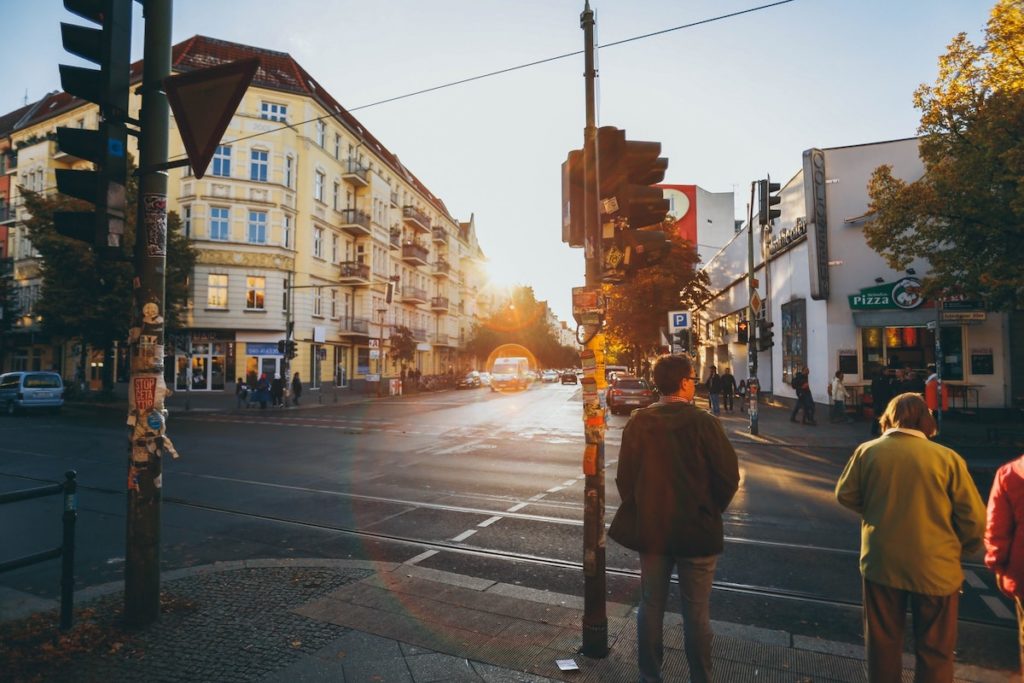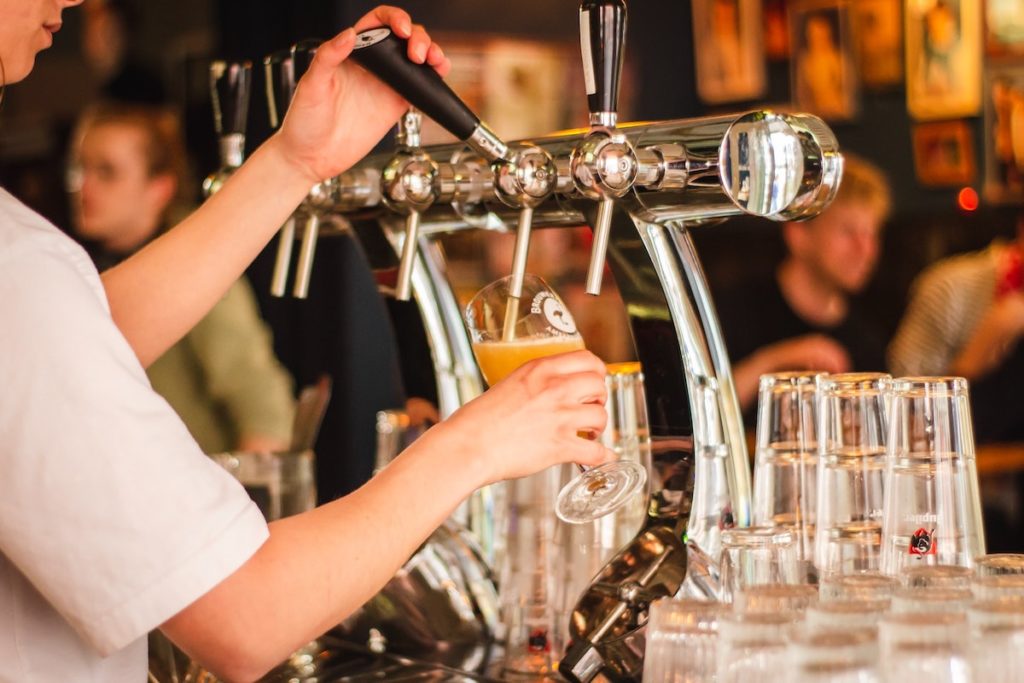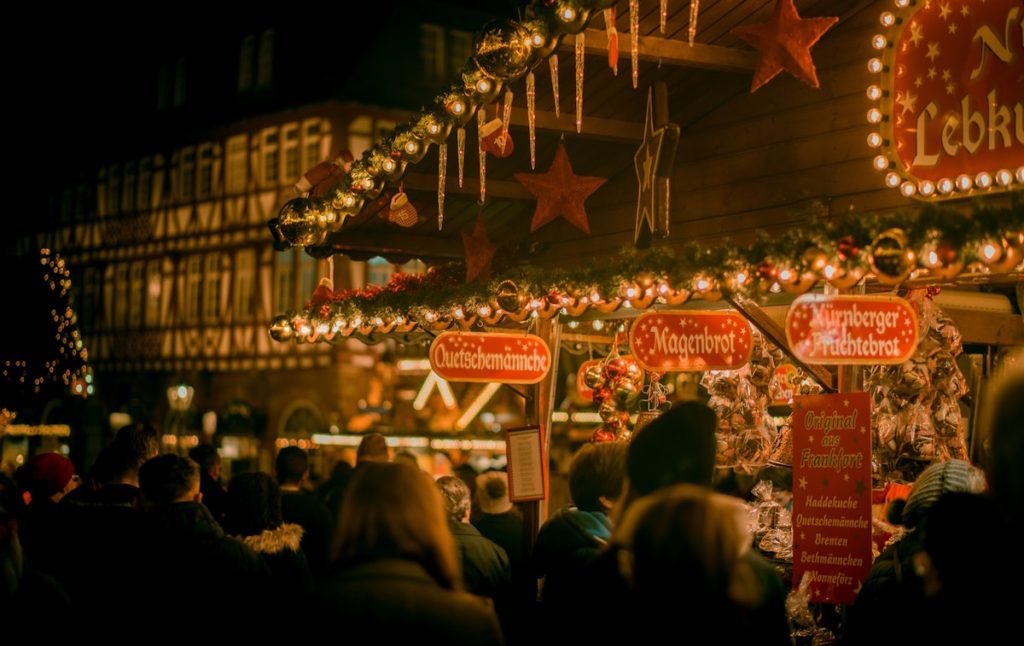Recently updated on July 3rd, 2025 at 03:58 pm
Exploring the fairy-tale Neuschwanstein Castle. Walking along the remnants of the graffiti-covered Berlin Wall. Sipping Bavaria’s rich beer-brewing heritage. Admiring beautiful Baroque architecture in Dresden. No matter where you are travellng in Germany, knowing some essential German words and phrases can help your trip run smoother – and make a good impression on the locals too. Best of all, if you learn these you’ll be all set for trips to Austria and Switzerland too. Win, win, win.
GET INSPIRED BY: Best of Germany


Greetings in German
1. Basic German phrases for travel: Hallo, Guten Tag, and more
Mastering a few key greetings is the perfect way to break the ice and show respect when traveling in German-speaking countries. The good news? Most of them are short, easy to remember, and immediately appreciated by locals.
- Hallo – The most universal and casual way to say hello. Works any time of day, and anywhere you go.
- Guten Tag – A slightly more formal version of “hello,” meaning “good day.” Ideal for shops, hotels or more professional settings.
- Guten Morgen – Say this before midday for “good morning.”
- Guten Abend – Use this in the evening for “good evening.”
- Tschüss – Casual way to say goodbye, a bit like “bye!”
- Auf Wiedersehen – A more formal “goodbye,” especially when leaving a restaurant or hotel.
- Grüß Gott – A common greeting in southern Germany and Austria, translating to “God greet you.” It’s traditional but still widely used in rural and Alpine areas.
- Servus – A warm, informal greeting used in southern Germany and Austria, meaning both hello and goodbye. Think of it like “ciao” in Italian.
- Moin – Heard in northern Germany, especially around Hamburg and the coast, “Moin” is a laid-back hello used morning, noon, or night.
2. Wie geht’s?
Few things immerse you in a destination quite like striking up a real conversation with locals. Asking “how are you?” is a brilliant way to start. If they ask back, you can reply “mir geht’s gut”, meaning “I am fine”. And if the conversation’s going really well, why not introduce yourself? Simply say “Ich heiße…” (I am called…) before your name, and ask “Wie heißt du?” to find out someone else’s. Use Wie war dein Tag to ask how was your day in German.
Remember: when you come across the ß (called an eszett, a character unique to the German language), simply pronounce it like “s”, as you would in the English “see”.
How to ask for directions in German
3. Entschuldigung
No matter what language you’re speaking, it’s good to have good manners – and the same applies to learning German. Just say “entschuldigung” (excuse me) to get the attention of hotel receptionists, ticket officers and waiters, or perhaps people who might look like they know the directions you need.
Incorporate this into a longer sentence “Entschuldigen sie, ist dies… ?” (excuse me, is this…?) when you’re on public transport and unsure where to get off.
4. Wo ist… ?
Where is…? An essential phrase for explorers. Simply add the name of your intended destination to the end. If you’re in Berlin, for instance, that could be the Brandenburger Tor (Brandenburg Gate), Berliner Fernsehturm (Berlin Television Tower) or Museumsinsel (Museum Island). More common places include the “Bahnhof” (train station), “Flughafen” (airport), “stadtzentrum” (city centre) and “supermarkt” (supermarket). Helpfully, “taxi” and “bank” are the same in German and English. As you now know Ist means ‘is’, you can start constructing more sentences, like Das ist (That is).
In this case, asking “zeigen sie mir das bitte auf der Karte?” (can you show me on the map?) can be a more foolproof way of getting where you want to go.
RELATED CONTENT: 5 hidden gems of Germany
5. Einmal nach… bitte
Germany’s public transport is among the world’s best, and a handful of basic german phrases can help you navigate the various transport systems. To ask for a ticket: “Einmal/ zweimal nach… bitte”, meaning “one ticket/ two tickets to (your destination) please”. Follow up with “was kostet das?” (how much is it?) and “wann fährt er ab?” (when does it leave?) and you’ll get from A to B in no time. (Hopefully.)


6. Ich bin verloren
If your phone dies, the map app glitches, or you take one wrong turn too many, “Ich bin verloren” (I am lost) is a helpful phrase to know. You can combine it with “Wo ist…?” or “Können Sie mir helfen?” (Can you help me?) and most locals will do their best to point you in the right direction. As a backup, carry a paper map – old school, but still effective.
How to order food in German
7. Ich hätte gerne…
Tucking into the culinary culture of a country is one of the best ways to get a real taste of your destination. Instead of just smiling and pointing, use simple German sentences like “kann ich bitte die Speisekarte haben? (can I have the menu, please?). Then simply add “Ich hätte gerne” (I would like) before the name of your preferred food, be it bratwurst (sausage), spätzle (egg noodles), kartoffelkloesse (potato dumplings) or schweininshaxe, a slow-roasted pork knuckle – best enjoyed with a local beer on the side. Sehr lekker! (Very tasty!)
Can’t decide what to order? Use this common German phrase: “Was empfehlen sie?” (what do you recommend?).
GET INSPIRED BY: Imperial Europe


8. Prost!
As the world’s largest beer festival, Oktoberfest is a huge draw for travellers and locals every autumn (usually late Steptember or early October), but beer is a big part of German culture year-round. These are some German words you need to know: “Prost!” (cheers!); “maß”, a litre glass jug of beer; and “Eins, Zwei, Drei, G’suffa!”, meaning “one, two, three, drink!”. You’ll probably want a few brezeln (pretzels) to soak up all that beer too.
This is a time when traditional clothing comes out the wardrobe. Expect to see the dirndl, a peasant-style pinafore, and lederhosen, leather trousers or shorts – or perhaps even get some to wear yourself.
RELATED CONTENT: Iconic Germany: 8 of the most incredible German sights
9. Ich esse kein(e)…
A less fun entry on this list, but necessary for any traveller with special dietary requirements. “Ich esse kein(e)…” translates as “I don’t eat… “. Follow up with “nüsse” (nuts), “milchproductke” (dairy) or “fleisch” (meat) as appropriate. “Gluten” is the same as in English, and you can explain that you are “vegetarier(in)” (vegetarian, adding the ‘in’ for female), “veganerin vegan or have “die Zöliakie” (coeliac disease).
10. Die Rechnung, bitte
The bill, please. An essential ending to any meal. “Kann ich zahlen?” (can I pay?) is a less formal way of asking. And “Entschldigung, wo ist die Toilette” (Excuse me, where is the toilet?) might also come in handy after all those beers.
GET INSPIRED BY: Best of Germany and Austria


Useful expressions in German
11. Was kostet das?
It’s inevitable you’ll end up parting with a few euros in shops, whether that’s on travel basics or souvenirs for yourself, and friends and family back home – especially if you visit a “weihnachtsmarkt” (Christmas market). “Nur schauen” (just looking); “darf ich mit Bargeld bezahlen?” (may I pay with cash?); “darf ich mit Kreditkarte bezahlen?” (may I pay with credit card?); and the aforementioned “was kostet das?” (how much is it?) should all be useful here.
GET INSPIRED BY: Christmas Markets of Austria, Germany and Switzerland
RELATED CONTENT: The best Christmas markets in Germany
12. Ich brauche einen Arzt
We sincerely hope you don’t have to use them, but if anything goes awry, “ich brauche einen Arzt” (I need to see a doctor) or “fahren sie mich bitte zum Krankenhaus” (take me to the hospital) are handy for the linguistic arsenal. Simply “Krankenhaus” should do the job in an emergency. Consider it the word equivalent of the traveller’s first aid kit.
13. Sprechen sie English?
Unless you’re fluent, there will, of course, be times when you reach the limits of your German language skills. In that case, ask “sprechen sie English?” (do you speak English?). There’s a good chance the answer will be yes; more than half of the people in Germany speak English, and more still in areas popular with travellers, such as Berlin, Hamburg, Frankfurt and Munich.
In this conversation, it might be worth adding “Ich verstehe nicht”, meaning I don’t understand, or “Ich spreche nicht gut Deutsch” (I do not speak German very well).
RELATED CONTENT: Germany Destination Guide


14. Haben Sie WLAN?
Wi-Fi has become a modern-day essential, and asking for it is simple in German: “Haben Sie WLAN?” (Do you have Wi-Fi?). You can follow up with “Wie ist das Passwort?” (What’s the password?) to get connected. Most cafes, restaurants and hotels will be familiar with the request – and many will even display the network and password on the menu.
15. Können Sie das bitte wiederholen?
When you’re still getting the hang of the language, don’t be afraid to ask someone to repeat themselves. A polite “Können Sie das bitte wiederholen?” (Can you repeat that, please?) goes a long way – especially if the speaker is talking quickly or using regional dialects. It’s a great one to memorise for those early days on the road when everything sounds like a fast blur.
16. Gibt es eine Tour auf Englisch?
Whether you’re heading into a museum, castle, or historic monument, asking “Gibt es eine Tour auf Englisch?” (Is there a tour in English?) can unlock a deeper understanding of the site. Most major tourist attractions, particularly World Heritage sites, offer multilingual walking tours or audio guides – you just have to ask.
What is the 80/20 rule in German?
The 80/20 rule—also known as the Pareto Principle—suggests that 80% of your results come from just 20% of your efforts. When it comes to learning German for travel, this means you don’t need to master the whole language to get by. Focus on the most common and practical German phrases—the greetings, polite questions, directions, and restaurant basics—and you’ll be able to navigate most situations with ease. It’s the smart way to sound confident, connect with locals, and get more out of your trip without memorising endless vocabulary.
What words have you found useful when traveling in Germany? Anything other phrases you’d like to know? Let us know in the comments.